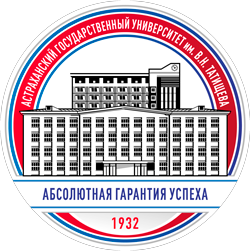Description of the strategic project
The Volga Delta has unique ecosystems, including wetlands, and largely determines the biodiversity of the Caspian region. The ecological situation in the region is tense: the volume of polluted wastewater discharged into the Volga basins is 38% of the total Russian. The load on the Volga’s water resources is eight times higher than the average for Russia. According to the UN, there is currently no territory facing a greater threat of desertification than the region between the Caspian Sea and the Pamir Mountains. This leads to a decrease in the species diversity of fish due to the impoverishment of the food ration, which hinders the growth of commercial fishing in the Caspian region. The developed unique technologies and approaches will contribute to the preservation of the region’s biodiversity and land resources, and the improvement of the ecological situation. The problematic for the Astrakhan region has a “cross-cutting” interdisciplinary nature, since is associated with ensuring the health and quality of life of people, stable economic growth, and reasonable consumption of resources. The strategic project is key for the university, the Astrakhan region and the Caspian macro-region in the logic of the national project “Ecology”, the UN Convention to Combat Desertification (UNCCD) and 17 UN Sustainable Development Goals (description of the project in the Appendix to the section).
Purpose of the strategic project
Increasing the level of environmental safety and preservation of natural systems in the Caspian region.
Objectives of the strategic project
– improvement and application of new technologies in ecology and environmental protection: degradation and desertification of soils, conservation of biodiversity;
– creation of new EP and areas of training with the inclusion of online courses of disciplines from partner universities[1]; additional EP[2] and bringing them to online platforms (Coursera, SkillShare, Edx, iSpring Market);
– creation of the research sector “Ecology and Climate”, the sector “High-performance computer systems and distributed data processing”;
– environmental education of schoolchildren;
– interpolation (adaptation) of the project to other arid or deltaic areas of the world[3].
Expected results of the strategic project
For the Caspian macro-region: introduction of technologies and methodological methods for restoration and conservation of biodiversity (rare endangered plants, flora and ichthyofauna); development of technologies for obtaining data for the operational adoption of management decisions, including in the event of natural or anthropogenic phenomena, and the restoration of degraded lands and prevention of their desertification.
For the Astrakhan region: practical implementation of unique environmental monitoring technologies to achieve leadership positions in automation and resource provision of integrated environmental monitoring of water areas using unmanned marine robots; development of methodological approaches and implementation of technological solutions for the restoration of land resources and ecosystems (degradation, desertification, siltation, irrational nature management); contributing to the improvement of ecology and preservation of unique biodiversity.
Effect for the university:
– development of promising areas of research and educational trajectories that have a competitive development advantage[4];
– leadership positions of ASU in the Caspian macro-region in the field of environmental protection of ecosystems of inland water bodies of the Earth and achievement of the positions of the middle group in the QS World University Rankings, the National University Ranking in the subject areas of environmental protection, ecology, earth sciences, agriculture, biodiversity;
– introduction of 10 individual trajectories of students, academic mobility in partner universities; 2 new network EPs; 3 online courses, on online platforms; an increase in the number of students enrolled in HE programs – up to 150 people;
– creation of a research sector “Ecology and Climate” with laboratories and centers in the areas[5];
– creation of the sector “High-performance computer systems and distributed data processing” – a supercomputer center for solving resource-intensive tasks, transferring, storing and processing data; a multipurpose hardware and software complex, a resource center for computing with high throughput and a data center with the output of monitoring parameters using AI technologies, BigData and DataScience;
– the number of interdisciplinary subprojects within the project – 14; the share of students involved in research project activities – 90%; postgraduate and doctoral students who received an academic degree – 4 people; international projects – 4; registered rights to RIA – 10.
[1] Systemic Environmental Disaster Management Specialist, Ecosystem Services Auditor, Eco Producer, Biological Responsibility Consultant, Bioremidiator, Ecosystem Restoration Architect, Urban Ecologist
[2] Ecoanalytics in the extractive industries, Fashion expert on environmental safety, Eco-trainer, Green Consulting
[3] Potentially, the project results are applicable to drylands, which account for approximately 39 – 45% of the total land surface.
[4] microbiology and bioremidation (microorganisms of soils, plants, animals), analytical chemistry of the environment and “green chemistry”, ITC (to find solutions to problems in the field of ecology and prevent large-scale environmental disasters), AI (control of environmental pollution; identification of plant species; ecosystem monitoring), robotics (robotic fish to combat pollution), data analysis (DataScience, the most vulnerable species of animals and plants, factors affecting life and habitat)
[5] onshore and offshore carbon polygons; spectrometry: analytical, optical, laser, atomic absorption and mass spectrometry; probe and confocal microscopy; express environmental monitoring; protection and restoration of soils; mathematical modeling of soil processes and ecosystems; physicochemical methods for the study of soils and ecosystems; water quality; problems of nature management, interaction of natural and socio-economic systems and the Caspian Space Monitoring Center
